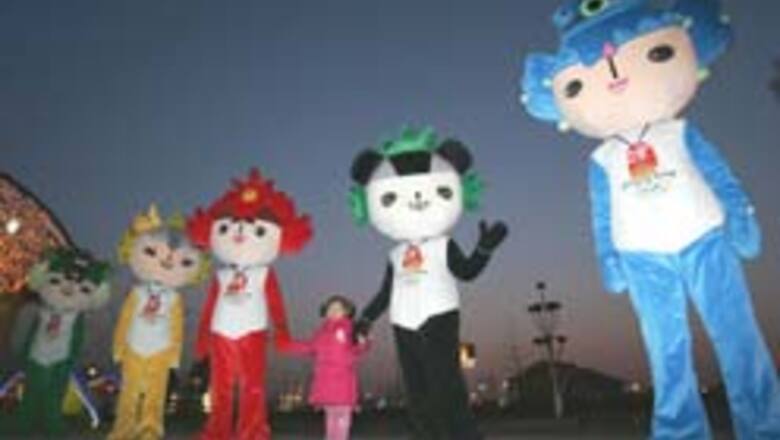
views
Paris: To go or not to go - world leaders invited to the opening ceremony of the Beijing Olympics faced a choice riddled with risks.
The guest list for Friday's big event suggests that the fear of losing Chinese business crosses continents and oceans, and ultimately outweighs outrage over China's human rights failings.
President Bush is going, as is Australia's premier. So is French President Nicolas Sarkozy, after he backed off a threat to boycott. Even Taiwan is sending a representative to the ceremony as ties warm between the rivals.
Other leading democracies were divided. The leaders of Britain, Germany and Canada are skipping the show.
Probably to the relief of Chinese authorities, so too are the authoritarian chiefs of Sudan, Zimbabwe and Iran, as is North Korea's dictator Kim Jong Il.
For China, the net result is a winning one.
The international turnout for the spectacle at the Bird's Nest National Stadium will drive home to viewers worldwide Beijing's message that China has arrived, whether its critics like it or not.
The sheer number of senior statesmen slated to attend has prompted some Chinese to liken it to imperial times when vassal states were expected to offer tokens of respect to Chinese emperors.
"It's like the practice in Chinese tradition of having all parts of the world come to pay tribute," said Xu Youyu, a retired philosophy professor and frequently outspoken critic of government policies.
"The Olympics also lets your own people know that the rest of the world confers legitimacy on and supports the government."
A total of 104 "national government dignitaries" from around the world will attend the games, Chinese organising committee chief Liu Qi said Tuesday.
He did not specify whether that meant heads of state or whether all would attend the opening ceremony. Western diplomats in Beijing believe more than 100 foreign leaders were asked and 80 or so are believed to be coming.
China has held the invitation list closely. Foreign Ministry spokesman Liu Jianchao said China did not solicit the foreign leaders, but that each country's Olympic committee did the inviting.
Deadly riots and a crackdown on protests in Tibet in March turned the opening ceremony invitation into a political hot potato for leaders of major democracies.
Tales of abused Tibetan monks reminded governments worldwide of the qualms many had over granting Beijing the Games in the first place.
PAGE_BREAK
Sarkozy was the first leader to threaten a boycott, urging talks between China and representatives of the Tibetan spiritual leader, the Dalai Lama.
That threat, followed by the Olympic torch relay through Paris streets packed with protesters, prompted a backlash by Chinese consumers and bloggers against France.
French desires to cool those tensions -- and to sell Airbus planes and nuclear equipment to Chinese customers -- eventually persuaded Sarkozy to climb down.
"Commercial and political reality took hold," said Don Paal, China specialist at the Carnegie Endowment for International Peace in Washington. "Knowing that the Chinese would take stock of those decisions ... very few statesmen could avoid showing up."
Australia's Prime Minister Kevin Rudd -- a fluent Chinese speaker -- is heading to Beijing after raising Chinese ire by suggesting in March that leaders there should engage more with the Dalai Lama.
He kept up the pressure on a visit the next month in Beijing. But China's and Australia's economies are increasingly linked, and Rudd has said does not believe in boycotting the Olympics.
Bush decided to attend the opening ceremonies, too, saying it would be an "affront to the Chinese people" if he stayed away.
The President of the European Parliament is among the few who have announced a formal boycott of the opening ceremony. Hans-Gert Poettering said he would skip the ceremony because of a lack of progress in talks between China and the Dalai Lama's representatives.
British Prime Minister Gordon Brown will only attend the closing ceremony and German Chancellor Angela Merkel has said, repeatedly, that the opening ceremony conflicts with her vacation.
Other leaders were glad to accept the invitation -- and hope to gain political and economic mileage from increasingly mighty China out of making the journey to Beijing.
"The Chinese leadership has signaled that coming earns points for the countries concerned," Paal said.
Brazil's President Luiz Inacio Lula da Silva plans to lobby for Rio de Janeiro's bid for the 2016 Olympics.
Lula has said nothing about human rights in China -- a huge and growing customer for Brazil's resources such as soy and iron ore.
Vladimir Putin, Prime Minister of growing Chinese trading partner Russia, is also going, as is Wu Poh-hsiung, chairman of Taiwan's ruling Nationalist Party.
Taiwan and China split amid civil war in 1949, and Beijing continues to see the island as part of its territory, to be brought back in the fold by force if necessary.\
Since taking office in May, Taiwan's President Ma Ying-jeou has undone pro-independence policies of his predecessor, embracing closer economic cooperation with the mainland.
The Caribbean island nation of Grenada is gladly supporting the Chinese games, after switching alliances from Taiwan to China in 2005.
Beijing showed its thanks by building a multimillion dollar cricket stadium on the tiny island last year -- and hundreds of Chinese school students will be sent out to wave flags in support of Grenada's nine Olympic athletes in Beijing.














Comments
0 comment